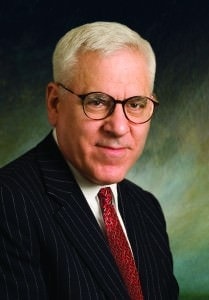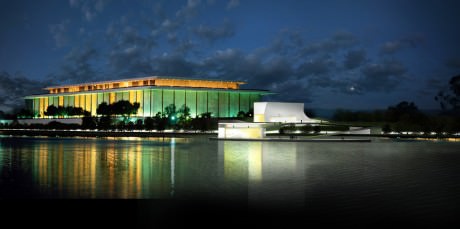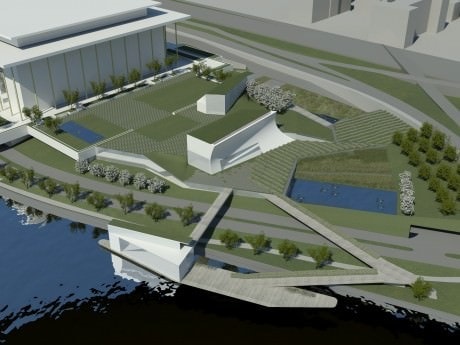David M. Rubenstein, Chairman of the John F. Kennedy Center for the Performing Arts, today announced an expansion project to be constructed south of the existing facility. The project will include rehearsal space as well as dedicated classroom space and multipurpose rooms for the Center’s extensive arts education and arts management education programs. Public access spaces will include gardens, an outdoor video wall upon which simulcast performances and other multimedia events may be projected, and an outdoor performance space on the river. The expansion will be designed by Steven Holl and senior partner Chris McVoy of Steven Holl Architects.

“I am proud to announce the selection of acclaimed Steven Holl Architects for the Kennedy Center expansion project and look forward to working with one of the foremost architects of our time,” stated Mr. Rubenstein. “Steven’s wonderful concept will create a strong visual presence that bolsters the Center’s prominence as the national cultural center, while maintaining its unique presence among Washington’s iconic landmarks.”
Steven Holl Architects was unanimously selected by the Kennedy Center board of trustees to design the project. Mr. Holl remarked, “It is a great honor to design the extension to the Kennedy Center, a ‘Living Memorial.’ In that spirit ours is part of a vital architecture, providing much needed rehearsal space, and classrooms with natural light and ventilation.”
Mr. Holl’s initial concept for the project includes three connected pavilions that will house classrooms, rehearsal rooms, lecture space, multipurpose rooms, and limited office space. In the initial concept, one pavilion will float on the Potomac River and offer an outdoor stage. Public gardens will fill out the space, fusing the Kennedy Center with the landscape and river. The exteriors will utilize translucent Okalux, glass, and Carrara marble, the same Italian marble which clads the original facility. The silhouette of the current building will be preserved by connecting the new structure underground and via the main plaza. A formal design will be created and announced in the coming months.
Kennedy Center President Michael M. Kaiser stated, “The Kennedy Center has the largest arts education program in the country without having any dedicated facilities to serve these growing programs. I’m so pleased the Kennedy Center will have spaces specifically designed for these functions to help fulfill our mission of bringing arts education to students across Washington and to millions of people across the country.”
The project is expected to cost approximately $100 million. Kennedy Center Chairman David M. Rubenstein will donate $50 million toward the design and construction of the new building. This generous pledge is among the largest ever given to a federally-connected nonprofit organization. The design and construction costs for the expansion project will be paid for entirely with private funds.
“I am pleased to pledge these funds as the lead gift to the Kennedy Center expansion project and encourage others to donate to this project,” stated Mr. Rubenstein. “As the federal budget tightens, I hope more Americans will consider including nonprofit federal entities in their own philanthropy as well.” Mr. Rubenstein’s other philanthropic endeavors include major gifts to the National Archives, the Washington Monument, and the Smithsonian Institution.
With Mr. Rubenstein’s $50 million lead gift, the Center has begun a major fundraising campaign of $125 million: $50 million more for the expansion project and an additional $25 million for major programming initiatives in the years ahead.

Mr. Kaiser said, “David Rubenstein’s generosity and leadership have created an enduring legacy and we are very grateful for his ongoing commitment to the Kennedy Center and to all of Washington. His patriotic philanthropy and belief in President Kennedy’s statement about Americans asking what they can do for their country benefits not only the Kennedy Center but the great nation it serves.”
David M. Rubenstein is the most generous donor in Kennedy Center history, with gifts totaling more than $75 million. In addition to two $10 million pledges in 2010 and 2011 for programming, educational, and outreach activities, including the Rubenstein Arts Access Program which seeks to make the arts accessible to children, young adults, and to people who have little or limited ability to attend and enjoy the performing arts, Mr. Rubenstein has underwritten several Kennedy Center, Washington National Opera, and National Symphony Orchestra programs. Last year, the Kennedy Center installed and inaugurated the $2 million Rubenstein Family Organ in the Concert Hall. Previous underwriting includes 2011’s The Presidency of John F. Kennedy: A 50th Anniversary Celebration, the 2010 International VSA Festival in the 2009-10 season, ARABESQUE: Arts of the Arab World in the 2008-09 season, Leonard Slatkin’s farewell performance and select KC Jazz Club performances in the 2007-08 season, the six month-long, District-wide Shakespeare in Washington festival in the 2006-07 season, the NSO Pops season in 2005-06, and the Kennedy Center’s original production of in the 2004-05 season.
Last June, a bill that authorized the Kennedy Center to construct an expansion project at the south end of the Kennedy Center grounds was unanimously approved by both houses of Congress and subsequently signed into law by President Obama. The bill stated that the costs of planning, design, engineering, and construction of the expansion project would be paid for using private funds. The Kennedy Center board formed a ten-member architect selection committee that was co-chaired by David M. Rubenstein and Fred Eychaner and included Jean Kennedy Smith and Victoria Reggie Kennedy, among other board members. The selection committee unanimously recommended Mr. Holl to the full board.
ABOUT STEVEN HOLL
Considered one of America’s most important architects, Steven Holl is recognized for his ability to blend space and light with great contextual sensitivity and to utilize the unique qualities of each project to create a concept-driven design. He specializes in seamlessly integrating new projects into contexts with particular cultural and historic importance. Mr. Holl has been recognized with architecture’s most prestigious awards and prizes, including the 2012 AIA Gold Medal, the RIBA 2010 Jencks Award, and the first ever Arts Award of the BBVA Foundation Frontiers of Knowledge Awards in 2009. In 2002, the Cooper-Hewitt National Design Museum awarded him its prestigious National Design Award in Architecture. In 2001, France bestowed the Grande Médaille d’Or upon him for Best Architect of the Academy of Architecture; in the same year Time magazine declared him “America’s Best Architect” for his “buildings that satisfy the spirit as well as the eye.” More information about Mr. Holl and past projects may be found atstevenholl.com.
ABOUT DAVID M. RUBENSTEIN
David M. Rubenstein is Chairman of the Kennedy Center, a role he has held since May 2010 following six years as a board member. He is Co-Chief Executive Officer and Co-Founder of The Carlyle Group, a global alternative asset manager based in Washington, DC. Mr. Rubenstein is actively involved in a range of civic and philanthropic endeavors, including serving as a Regent of the Smithsonian Institution, President of the Economic Club of Washington, and on the Boards of Directors or Trustees of Duke University (Vice Chair), the Brookings Institution (Vice Chair), the Council on Foreign Relations (Vice Chair), and the Institute for Advanced Study.
ABOUT THE JOHN F. KENNEDY CENTER FOR THE PERFORMING ARTS
Designed by American architect Edward Durrell Stone, the John F. Kennedy Center for the Performing Arts is America’s living memorial to President Kennedy. Under the guidance of Chairman David M. Rubenstein, President Michael M. Kaiser, and Music Director Christoph Eschenbach, the nine theaters and stages of the nation’s busiest performing arts facility attract audiences and visitors totaling 3 million people annually; Center-related touring productions, television, and radio broadcasts welcome 40 million more.
Opening its doors on September 8, 1971, the Center presents the greatest performances of music, dance, and theater; supports artists in the creation of new work; and serves the nation as a leader in arts and arts management education. With its artistic affiliates, the National Symphony Orchestra and Washington National Opera, the Center’s achievements as a commissioner, producer, and nurturer of developing artists have resulted in more than 300 theatrical productions, and dozens of new ballets, operas, and musical works.
Each year, millions of people nationwide take part in innovative, inclusive, and effective education programs initiated by the Center, including school- and community-based residencies and consultancies, age-appropriate performances and events for young people, career development for young actors, dancers, singers and instrumentalists, and professional learning opportunities for teachers, teaching artists and school administrators. These programs have become models for communities across the country. The Center’s Any Given Child program works with selected local school districts and seeks to provide a comprehensive arts education to children K-8. The Center also has been at the forefront of making the performing arts accessible to persons with disabilities, highlighted by the work accomplished with its affiliate, VSA.
The Kennedy Center is a leader in arts management education. Through its DeVos Institute of Arts Management at the Kennedy Center, advanced training is provided for arts administrators at varying stages of development, working with arts organizations and leaders throughout the United States and in more than 70 countries.
As part of the Kennedy Center’s Performing Arts for Everyone outreach program, the Center stages more than 400 free performances of music, dance, and theater by artists from throughout the world each year on the Center’s main stages, and every evening at 6 p.m. on the Millennium Stage. Announced in 2011, the Rubenstein Arts Access Program expands the Center’s efforts to make the arts accessible to children, young adults, and to people who have little or limited ability to attend and enjoy the performing arts, enabling audiences to engage in more ways, at more times, and in more places than ever before.

Here is more information about the Kennedy Center expansion project.




